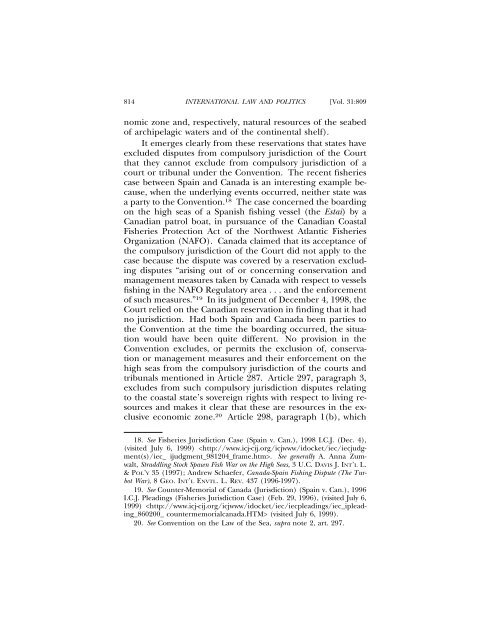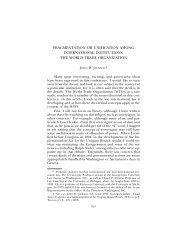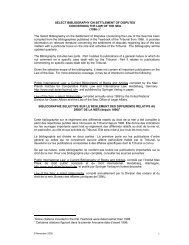Tullio Treves, Conflicts Between the International Tribunal for the ...
Tullio Treves, Conflicts Between the International Tribunal for the ...
Tullio Treves, Conflicts Between the International Tribunal for the ...
You also want an ePaper? Increase the reach of your titles
YUMPU automatically turns print PDFs into web optimized ePapers that Google loves.
814 INTERNATIONAL LAW AND POLITICS [Vol. 31:809nomic zone and, respectively, natural resources of <strong>the</strong> seabedof archipelagic waters and of <strong>the</strong> continental shelf).It emerges clearly from <strong>the</strong>se reservations that states haveexcluded disputes from compulsory jurisdiction of <strong>the</strong> Courtthat <strong>the</strong>y cannot exclude from compulsory jurisdiction of acourt or tribunal under <strong>the</strong> Convention. The recent fisheriescase between Spain and Canada is an interesting example because,when <strong>the</strong> underlying events occurred, nei<strong>the</strong>r state wasa party to <strong>the</strong> Convention. 18 The case concerned <strong>the</strong> boardingon <strong>the</strong> high seas of a Spanish fishing vessel (<strong>the</strong> Estai) by aCanadian patrol boat, in pursuance of <strong>the</strong> Canadian CoastalFisheries Protection Act of <strong>the</strong> Northwest Atlantic FisheriesOrganization (NAFO). Canada claimed that its acceptance of<strong>the</strong> compulsory jurisdiction of <strong>the</strong> Court did not apply to <strong>the</strong>case because <strong>the</strong> dispute was covered by a reservation excludingdisputes “arising out of or concerning conservation andmanagement measures taken by Canada with respect to vesselsfishing in <strong>the</strong> NAFO Regulatory area . . . and <strong>the</strong> en<strong>for</strong>cementof such measures.” 19 In its judgment of December 4, 1998, <strong>the</strong>Court relied on <strong>the</strong> Canadian reservation in finding that it hadno jurisdiction. Had both Spain and Canada been parties to<strong>the</strong> Convention at <strong>the</strong> time <strong>the</strong> boarding occurred, <strong>the</strong> situationwould have been quite different. No provision in <strong>the</strong>Convention excludes, or permits <strong>the</strong> exclusion of, conservationor management measures and <strong>the</strong>ir en<strong>for</strong>cement on <strong>the</strong>high seas from <strong>the</strong> compulsory jurisdiction of <strong>the</strong> courts andtribunals mentioned in Article 287. Article 297, paragraph 3,excludes from such compulsory jurisdiction disputes relatingto <strong>the</strong> coastal state’s sovereign rights with respect to living resourcesand makes it clear that <strong>the</strong>se are resources in <strong>the</strong> exclusiveeconomic zone. 20 Article 298, paragraph 1(b), which18. See Fisheries Jurisdiction Case (Spain v. Can.), 1998 I.C.J. (Dec. 4),(visited July 6, 1999) . See generally A. Anna Zumwalt,Straddling Stock Spawn Fish War on <strong>the</strong> High Seas, 3 U.C. DAVIS J. INT’L L.& POL’Y 35 (1997); Andrew Schaefer, Canada-Spain Fishing Dispute (The TurbotWar), 8 GEO. INT’L ENVTL. L. REV. 437 (1996-1997).19. See Counter-Memorial of Canada (Jurisdiction) (Spain v. Can.), 1996I.C.J. Pleadings (Fisheries Jurisdiction Case) (Feb. 29, 1996), (visited July 6,1999) (visited July 6, 1999).20. See Convention on <strong>the</strong> Law of <strong>the</strong> Sea, supra note 2, art. 297.






